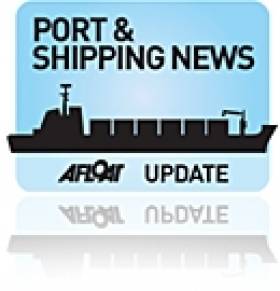Displaying items by tag: Arklow Bank
Marine Notice: Cetacean Acoustic Monitoring at Arklow Bank and Gorey
The Department of Transport has been advised by University College Cork (UCC) that it intends to deploy hydrophones east of the Arklow Bank at four locations, and southwards to 15km off the bank and east of Gorey and Blackwater.
This marine science research aims to describe seasonal and diurnal occurrence of the cetaceans (the order of marine wildlife that comprises whales, dolphins and porpoise) present in the areas.
UCC plans to deploy four moorings with attached hydrophones on the seabed between the dates of Monday 5 and Saturday 17 February, subject to operational and weather constraints. The moorings will be fully recovered after three to four months for maintenance and then redeployed.
The hydrophones will be deployed in four locations in a latitudinal gradient, from east of the turbines at the Arklow Bank to 10km south of the bank, east of Gorey and Blackwater, Co Wexford.
A single vessel will be used for deploy the hydrophones: the Sharpshooter (callsign EI5069). Deployment operations will be conducted during the hours of daylight, during favourable weather conditions.
Throughout operations, the vessel will be displaying the appropriate lights and shapes as required under the COLREGS Rule 27(b). As Sharpshooter will be deploying survey equipment and moorings, the vessel will be restricted in its ability to manoeuvre, therefore all other vessels are requested to leave a wide berth.
Coordinates and a map of the survey areas as well as contact details can be found in Marine Notice No 05 of 2024, attached below.
Marine Notice: UCD DAS Survey in Southern Irish Sea Off Wexford and Wicklow
Research survey TC22016 will be carried out in the southern Irish Sea off the Wexford/Wicklow coast by University College Dublin from next Wednesday 30 November to Friday 9 December, subject to weather and operational constraints.
The aim of this research project is to test novel low-impact marine sensors to aid in better understanding of seabed processes and sub-bottom conditions.
Survey works will be conducted on and around Arklow Bank by the State’s latest marine research vessel, the RV Tom Crean (callsign EIYX3), which will display appropriate lights and signals.
Within the defined areas, the vessel will be undertaking deployment of equipment and operation of acoustic sources during daylight hours, and sparker and multi-beam acoustic operations during the night.
All operations will be carried out in accordance with safe operating practices and MMO procedures and cognisant of fishing gear. All surface equipment will display appropriate lighting while deployed.
As the vessel will be limited in its ability to manoeuvre at times when undertaking operations, other vessels are kindly requested to keep a wide berth.
Mariners as also asked to note that a wind turbine was set on fire by a suspected lightning strike last month in the location of this planned survey and that there is a radio navigation warning in force. All vessels are requested to keep at least 500 metres clear of the turbine.
Maps and coordinates of the survey area as well as contact details can be found in Marine Notice No 79 of 2022, attached below.
Rudder Problems for German Containership Dry Docked in Dublin Port
#ShipRudder- A German-owned containership Arslan II (1991/3,125grt) that is understood to have got into difficulties due to rudder problems along Arklow Bank in mid-January, currently remains in a Dublin dry-dock, writes Jehan Ashmore.
An initial tow of the Arslan II was carried out by a tug to Dublin Bay from where a Dublin Port Company tug Shackleton joined to assist towing the 260TEU container capacity vessel to the Coal Quay. Arsalan II was subsequently moved into the No.2 dry-dock facility of Dublin Graving Docks Ltd.
Arslan II was a familiar trader in the Irish Sea for more than two decades and moreso under her previous name of Coastal Isle until November 2013. She had operated Peel Ports Group subsidiary Coastal Container Line services that included the Dublin (MTL Terminal)–Liverpool route.
Last summer the Peel Ports Group carried out restructuring of operations that saw Coastal Container Line merged into BG Freight Line's Irish Sea and short-sea continental route network.
A sister, Coastal Deniz as previously reported on Afloat.ie continues to run for Peel Port Group's 'green' inland waterway shuttle service between Liverpool (Seaforth Container Terminal) and Manchester (Irlam Container Terminal) using the 58km/36-mile long Manchester Ship Canal.





























































